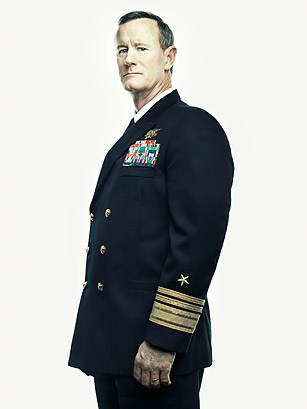
(4 of 4)
Over the next two years, McRaven became principal author of Bush's National Strategy for Combating Terrorism. One of its central messages was intended to caution against a literal idea of combat: "We will not triumph solely or even primarily through military might. We must fight terrorist networks, and all those who support their efforts to spread fear around the world, using every instrument of national power — diplomatic, economic, law enforcement, financial, information, intelligence, and military."
Then it was back to operations. For most of the past decade, McRaven hunted down high-value targets overseas. He was running special operations in Iraq when Task Force 121, a clandestine unit under JSOC, tracked Saddam Hussein to his spider hole. Thomas O'Connell, then Assistant Secretary of Defense, paid him a visit, and the two shared cigars just outside the former Iraqi President's prison cell. In 2008, McRaven succeeded Army Lieut. General Stanley McChrystal as JSOC's top commander.
Taking Apart al-Qaeda
Bush famously kept a list of al-Qaeda leaders in his Oval Office desk drawer and drew an X over each face as the target was captured or killed. But new leaders always stepped in. It became a dark joke in military and intelligence circles that the U.S. knocked off al-Qaeda's No. 3 commander twice a year.
"Look how much of their leadership we've taken apart and how long it's taken, and the movement is still not dead," says Wade Ishimoto, a former Delta Force intelligence officer. Cartwright, the Marine general, says, "If every time you knock one off all they do is replace him, how valuable was that, particularly if you ... could have been watching him?"
Does killing high-value targets make sense as a recipe to defeat al-Qaeda? McRaven says it is just one part of a broader offensive against America's foes. "There is nobody in the U.S. government that thinks we can kill our way to victory, certainly not the special-operations guys," he says, "but what happens is, by capturing and killing some of these high-value targets, we buy space and time for the rest of the government to work."
Meanwhile, JSOC carries on with those 2,500 commando raids a year, an average of seven per night.
There are costs. McRaven says civilians die in fewer than 1% of the raids, a good record in close urban combat, but it still means U.S. commandos are killing noncombatants twice a month.
"Special forces have taken greater measures in the last year and a half to reduce civilian casualties," says Erica Gaston, who wrote a report for the Open Society Foundations, "but one night raid in a village can be enough to turn [people] against international and Afghan government efforts."
A Fourth Star
McRaven speaks respectfully of Bush as Commander in Chief, saying he "made some very, very tough decisions." About Obama, without a question to prompt him, he waxes lyrical and at length. The planning and decisionmaking for the bin Laden raid, he volunteers, "was really everything the American public would expect from their national leadership."
"The President was at all times presidential," he says. "I would contend he was the smartest guy in the room. He had leadership skills we'd expect from a guy who had 35 years in the military." The sentiments appear to be mutual, for McRaven and his special-operations units. In April, a month before the bin Laden raid, Obama tapped McRaven for his fourth star and nominated him to lead the U.S. Special Operations Command. He began the new job this summer. Few believe it will be his last. McRaven's special operators, meanwhile, are flying high. While the rest of the Pentagon is scaling back spending, special-operations forces are asking for more. Television, film and video games have infused popular culture, and the political debate, with the power of special warfare to get the job done on the cheap. The potency of that image may depend on making sure the triumph in Abbottabad is not succeeded by another Desert One or Black Hawk down. "Everybody will try to fix all evils with a success, but that only lasts until you screw something up," Cartwright says. "People like McRaven know that."